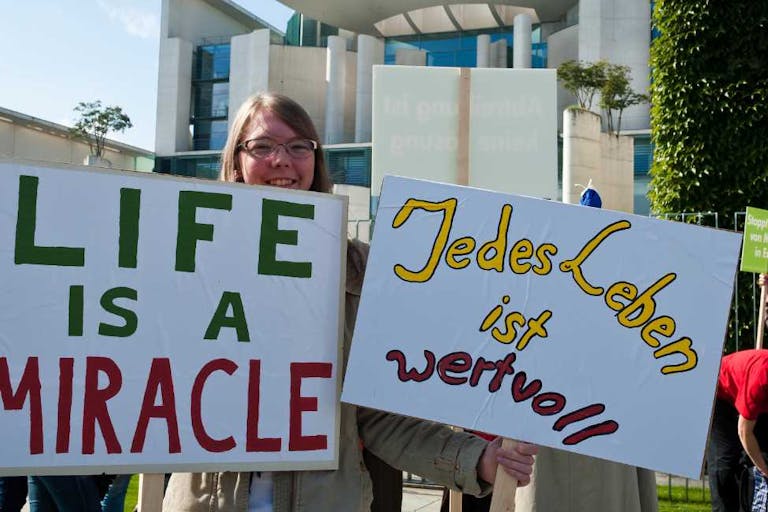
Woman sues serial sperm donor featured on Netflix docuseries, ‘The Man with 1000 Kids’
Nancy Flanders
·
Activism·By Anne Marie Williams, RN, BSN
Pro-lifers in Germany seek to educate and motivate others in midst of hostile culture
For years, the pro-life movement in Germany has faced numerous challenges. Though the country has 80 million people, its largest pro-life group, Aktion Lebensrecht für Alle (ALfA), numbers just 11,000 members. Those who are willing to talk about abortion at all are overwhelmingly likely to be in support of it.
Another likely contributing factor to the national hush surrounding abortion is that fewer people are identifying as Christians, let alone practicing their religion outwardly. Historically, the government and the courts have not been particularly friendly to a pro-life presence outside abortion facilities. Throw in raucous and sometimes violent pro-abortion counter-protesters all but certain to show up at any public pro-life event, and pro-lifers in Germany face a daunting uphill battle to awaken consciences and change minds about the genocide occurring in their country today.
And yet, inspired by the tactics and successes of the pro-life movement in America, a small but growing number of Germans is becoming increasingly bold in the efforts to turn the tide of public opinion.
A recent WORLD article about the pro-life movement in Germany summarized both the current state of affairs as well as reasons for hope there. American-born Alicia Düren now lives there with her German husband and three children. When she attended a pro-life event for the first time in June of 2019, she was struck that there were just as many pro-abortion counter-protesters as pro-lifers, and recalled that their seething rage was palpable.
She told WORLD, “It was really, really my first confrontation with people who just hate life.” But rather than being cowed by her experience, Düren commented, “From that event, which was pretty traumatic for me, I realized there was really a need to do something … here in Germany.”
READ: German court allows ban on pro-life prayer vigil at abortion center to stand
Düren was disappointed to find that by and large pro-lifers in Germany are often “too quiet. They’re mostly Christian people who are just nice people who don’t want to hurt anyone’s feelings.”
Article continues below
Dear Reader,
Have you ever wanted to share the miracle of human development with little ones? Live Action is proud to present the "Baby Olivia" board book, which presents the content of Live Action's "Baby Olivia" fetal development video in a fun, new format. It's perfect for helping little minds understand the complex and beautiful process of human development in the womb.
Receive our brand new Baby Olivia board book when you give a one-time gift of $30 or more (or begin a new monthly gift of $15 or more).
Cornelia Kaminski, who heads ALfA, has found that pro-life beliefs are hugely unpopular, stating bluntly, “When you’re pro-life in Germany, you’re a freak.” While in America, minority groups are often treated with deference, tolerance, or even a fair hearing, such treatment is far from common for pro-lifers in Germany. According to WORLD, Kaminski “described pro-abortion protesters grabbing pro-lifers’ posters, throwing crucifixes in the river, and yelling that Mary should have aborted baby Jesus.”
Both Düren and Kaminski cited the pro-life movement in America as galvanizing their own efforts. Düren and her husband, Andreas, recently formed a pro-life group called Sundays for Life, patterning their name on environmental activist Greta Thunberg’s Fridays for Future group. Sundays for Life organizes weekly public demonstrations on the town square in Augsburg utilizing pro-life signs, including signs with graphic abortion images on them. Surprisingly, for a country where denying the occurrence of the Holocaust is actually illegal, visual reminders of the ongoing genocide of preborn human beings fell out of favor almost 30 years ago after the media misconstrued their use as a coercion tactic to pressure women. Sundays for Life now attracts up to 30 people each time.
And in 2020, the group took to social media, seeking to replicate the efforts of organizations like Live Action, whose viral abortion procedures videos spurred them to film a similar video in German with voiceover by a German gynecologist. Sundays for Life’s social media efforts have already been rewarded with some 17,000 followers online.

Slowly, the pro-life message appears to be gaining a wider audience in Germany, as evidenced by 8,000 attendees at the annual Berlin March for Life in 2019, before COVID-19 measures forced a much smaller gathering in 2020. The 2019 attendance marked a 2,700 person increase from just one year previous.
Though technically illegal, various exceptions in Germany’s law effectively allow abortion on demand up through 12 weeks gestation provided that mandatory counseling is given to the woman first. As early as September, German citizens could consider a measure to do away with a rule that prohibits the advertisement of abortion ‘services.’
“Like” Live Action News on Facebook for more pro-life news and commentary!
Live Action News is pro-life news and commentary from a pro-life perspective.
Contact editor@liveaction.org for questions, corrections, or if you are seeking permission to reprint any Live Action News content.
Guest Articles: To submit a guest article to Live Action News, email editor@liveaction.org with an attached Word document of 800-1000 words. Please also attach any photos relevant to your submission if applicable. If your submission is accepted for publication, you will be notified within three weeks. Guest articles are not compensated (see our Open License Agreement). Thank you for your interest in Live Action News!

Nancy Flanders
·
Activism
Bridget Sielicki
·
Guest Column
Mark Lee Dickson
·
Guest Column
Mark Lee Dickson
·
Guest Column
Mark Lee Dickson
·
Activism
Nancy Flanders
·
Human Interest
Anne Marie Williams, RN, BSN
·
Issues
Anne Marie Williams, RN, BSN
·
Analysis
Anne Marie Williams, RN, BSN
·
Analysis
Anne Marie Williams, RN, BSN
·
Issues
Anne Marie Williams, RN, BSN
·